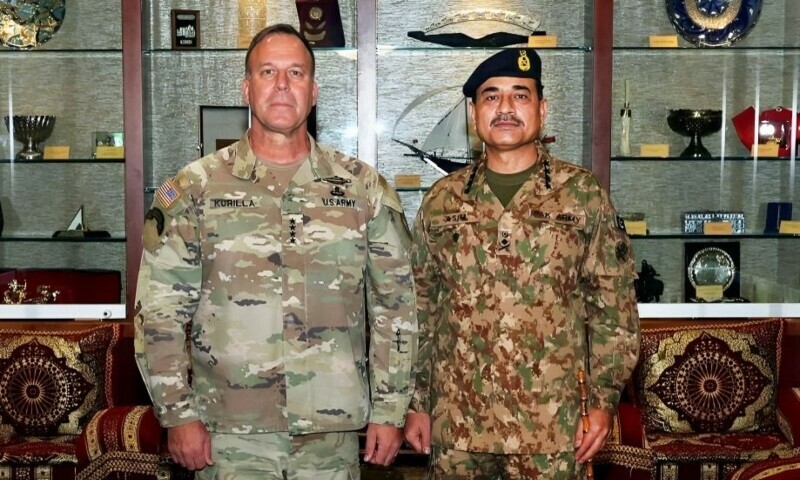Staff Report
ISLAMABAD: US President Donald Trump and Chief of Army Staff (COAS) Field Marshal Syed Asim Munir discussed joint counterterrorism efforts and expanding bilateral trade during their “cordial” meeting in Washington, the military’s media wing said on Thursday.
Gen Munir met with Trump at the White House yesterday, becoming the first serving chief of army staff to have a face-to-face meeting with a sitting US president. The occasion also marked the first time a serving Pakistani army chief had been formally received at this level, without holding political office or governing under martial law.
The high-level engagement was scheduled at the Cabinet Room over luncheon followed by a visit to the Oval Office.
Secretary of State Senator Marco Rubio and Special Representative for Middle Eastern Affairs Steve Witkoff were present during the meeting from the US side, while National Security Advisor Lt Gen Muhammad Asim Malik — also the intelligence chief — accompanied the COAS.
“Although initially scheduled for one hour, the meeting extended for over two hours, underscoring the depth and cordiality of the dialogue,” the ISPR said in a press release.
During the meeting, Trump “lauded Pakistan’s ongoing efforts for regional peace and stability, and appreciated the robust counterterrorism cooperation between the two states”, the statement said.
It noted that both sides reaffirmed their commitment to continued collaboration in the field of counterterrorism.
“Discussions also encompassed avenues for expanding bilateral cooperation in multiple domains including trade, economic development, mines and minerals, artificial intelligence, energy, cryptocurrency, and emerging technologies,” the ISPR stated.
“President Trump expressed keen interest in forging a mutually beneficial trade partnership with Pakistan based on long-term strategic convergence and shared interests,” it highlighted.
The US president also commended Field Marshal Munir’s “leadership and decisiveness during a period of complex regional dynamics”.
The army chief extended an invitation to Trump, on behalf of the government, to undertake an official visit to Pakistan at a mutually convenient date, the ISPR said, calling it a “gesture reflecting the warmth of bilateral ties”.
On his part, COAS Munir conveyed the deep appreciation of the government and people of Pakistan for Trump’s “constructive and result-oriented role in facilitating a ceasefire between Pakistan and India in the recent regional crisis”.
He “acknowledged President Trump’s statesmanship and his ability to comprehend and address the multifaceted challenges faced by the global community”, the ISPR press release said.
“A detailed exchange of views also took place on the prevailing tensions between Iran and Israel, with both leaders emphasising the importance of resolution of the conflict,” it added, referring to the ongoing missile exchange between the two regional arch foes that marks a week today.
The military notes that the engagement “marks a significant moment in the ongoing efforts to reinforce the longstanding partnership between Pakistan and the United States, built upon shared objectives of peace, stability, and prosperity”.
When questioned about the meeting in an interaction with the media later, Trump said, “I was honoured to meet him (Field Marshal Munir) today.”
Asked whether the talks included the current Iran-Israel conflict, Trump said: “They (Pakistan) know Iran very well, better than most, and they’re not happy about anything. It’s not that they’re bad with Israel. They know them both, actually, but they know Iran better.
“He (Field Marshal Munir) agreed with me. The reason I had him here was that I wanted to thank him for not going into the war [with India]. And I want to thank PM Modi as well, who just left a few days ago. We’re working on a trade deal with India and Pakistan. These two very smart people decided not to keep going with a war that could have been a nuclear war. Pakistan and India are two big nuclear powers.”
Questioned by reporters about the meeting prior to it, Trump remarked, “This man (Gen Munir) was extremely influential in stopping it (India-Pakistan fighting) from the Pakistan side.”
White House spokeswoman Anna Kelly said Trump was hosting Field Marshal Munir after he called for the president to be nominated for the Nobel Peace Prize for preventing a nuclear war between India and Pakistan, Reuters reported.
But insiders suggested that the meeting was not arranged through routine diplomatic channels, but rather was the outcome of “unorthodox efforts” by a group of advisers, businessmen, and other influential figures.
Diplomatic sources in Washington said this initiative had been cooking for months and kept under wraps until the White House released Trump’s official schedule on Tuesday.
Sources said that deepened counter-terrorism cooperation, engagement with crypto-linked influence networks, and targeted lobbying via Republican-aligned firms in Washington helped Pakistan secure the meeting.
Previous military rulers — such as Field Marshal Ayub Khan, Gen Ziaul Haq, and Gen Pervez Musharraf — met US presidents only after they had assumed the role of head of state.
Former president Barack Obama did briefly “walk in” on a White House meeting with then-COAS Gen Ashfaq Parvez Kayani, but that too was not a formal engagement.

